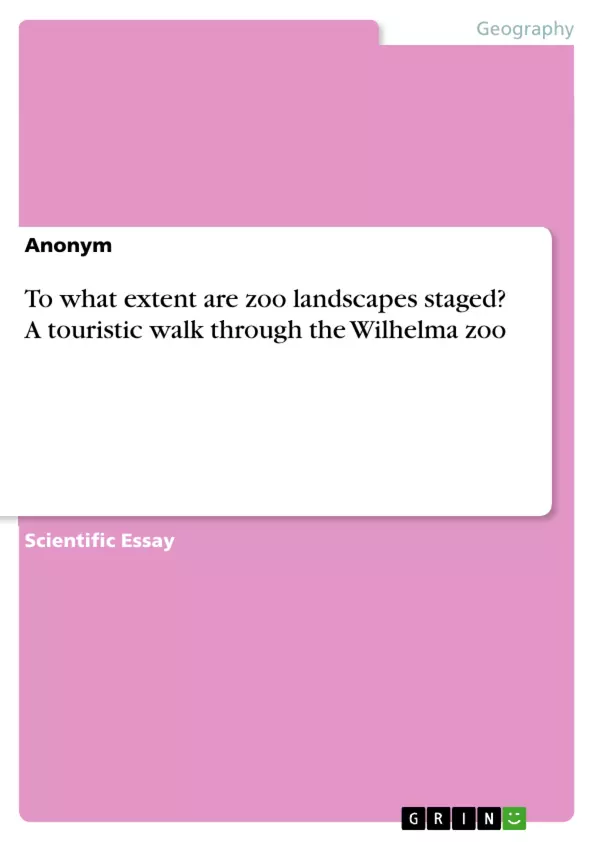This article deals with the staging of zoo landscapes. The Wilhelma Zoo in Stuttgart was examined using a phenomenological approach. In particular, aspects such as the perception of zoo landscapes and atmospheres as well as the question of how the tourist experience is influenced by the staged theme worlds are examined. First, the history and development of zoological gardens is outlined. This is followed by the theoretical framing, which combines social constructivist landscape research, the concept of atmosphere, phenomenology, Foucault's other spaces, theme worlds, landscape hybrids and the tourist experience towards the object of study. With the phenomenological approach, a strong interlocking of theory and empiricism is brought about. Therefore, the method of the phenomenological walk is also described in parallel, linked with theory and finally interpreted. In addition to the clearly more intensive engagement with the staged zoo landscapes due to the method, the focus on the tourist experience rather than on a realistic representation for the living beings is particularly noticeable. The representation of something different and an observable immersive effect are also aspects that will be discussed in more detail in this article.
Inhaltsverzeichnis (Table of Contents)
- 1 Introduction
- 2 Social Constructivism and Theme Worlds as Theoretical Framework
- 3 A Phenomenological Walk Through Wilhelma Zoo
- 4 Our Subjective Gain in Knowledge as Visitors
- 5 Conclusion and Outlook
Zielsetzung und Themenschwerpunkte (Objectives and Key Themes)
This article aims to investigate the staging of zoo landscapes through a phenomenological study of Wilhelma Zoo in Stuttgart. It explores how the perception of zoo landscapes and atmospheres shapes the tourist experience within the context of staged theme worlds. The study examines the interplay between landscape and tourism, considering how representations of landscape enhance visitor appeal and influence viewer perception.
- The staging of zoo landscapes and its impact on visitor experience.
- The role of social constructivism in shaping perceptions of zoo landscapes.
- The creation and influence of atmospheres within the zoo environment.
- The concept of theme worlds and their application to the zoo setting.
- The hybridity of cultures and spaces within the zoo.
Zusammenfassung der Kapitel (Chapter Summaries)
1 Introduction: This introductory chapter sets the stage for the study by exploring the historical development of zoos, from symbols of wealth to places of entertainment and education. It highlights the increasing focus on the tourist experience, with the addition of attractions designed to enhance visitor engagement. The chapter introduces the key research question: to what extent are zoo landscapes staged, and how does this staging affect the visitor's experience? It lays the groundwork for a phenomenological approach to studying the Wilhelma Zoo, emphasizing the subjective experience and perception of the visitor.
2 Social constructivism and theme worlds as theoretical framework: This chapter establishes the theoretical foundation for the study, grounding it in social constructivist landscape research. It explains the concept of landscape as a social construct, emphasizing the role of social patterns of interpretation and evaluation in shaping our understanding of landscapes. The chapter links this perspective to phenomenological sociology, focusing on how individual experiences and perceptions contribute to the social construction of landscapes. Key concepts like atmosphere, hybridity, and Foucault's "heterotopias" are introduced, providing a framework for analyzing the Wilhelma Zoo as a complex interplay of physical space, social constructions, and visitor experience. The chapter emphasizes the importance of studying the subjective, multi-sensory experience of the visitor and lays the foundation for the following chapters by clearly identifying the theoretical positions applied in the empirical study.
Schlüsselwörter (Keywords)
Zoological garden, phenomenological walk, social constructivism, landscape staging, visitor experience, atmosphere, hybridity, theme worlds, tourism.
Frequently asked questions
What is the main objective of the study discussed in the provided text about landscape staging and visitor experience?
The main objective is to investigate the staging of zoo landscapes through a phenomenological study of Wilhelma Zoo in Stuttgart. It aims to understand how the perception of zoo landscapes and atmospheres shapes the tourist experience within the context of staged theme worlds.
What are the key themes explored in the study?
The key themes include the staging of zoo landscapes and its impact on visitor experience, the role of social constructivism in shaping perceptions of zoo landscapes, the creation and influence of atmospheres within the zoo environment, the concept of theme worlds and their application to the zoo setting, and the hybridity of cultures and spaces within the zoo.
What is the theoretical framework used in this study?
The study is grounded in social constructivist landscape research and phenomenological sociology. It emphasizes the role of social patterns of interpretation and evaluation in shaping our understanding of landscapes, focusing on individual experiences and perceptions.
What is the focus of the introductory chapter?
The introduction explores the historical development of zoos, from symbols of wealth to places of entertainment and education. It highlights the increasing focus on the tourist experience and introduces the key research question: to what extent are zoo landscapes staged, and how does this staging affect the visitor's experience?
What concepts are used to analyze the Wilhelma Zoo?
Key concepts used for analysis include atmosphere, hybridity, and Foucault's "heterotopias," providing a framework for understanding the zoo as a complex interplay of physical space, social constructions, and visitor experience.
What is the meaning of the term "landscape staging"?
Landscape staging refers to the deliberate construction and manipulation of landscape elements to create a specific experience or impression for visitors. It involves designing and arranging physical spaces to enhance their appeal and influence viewer perception, often creating a themed environment.
What keywords are associated with this study?
The keywords associated with this study include: Zoological garden, phenomenological walk, social constructivism, landscape staging, visitor experience, atmosphere, hybridity, theme worlds, and tourism.
- Arbeit zitieren
- Anonym (Autor:in), 2022, To what extent are zoo landscapes staged? A touristic walk through the Wilhelma zoo, München, GRIN Verlag, https://www.hausarbeiten.de/document/1565375


